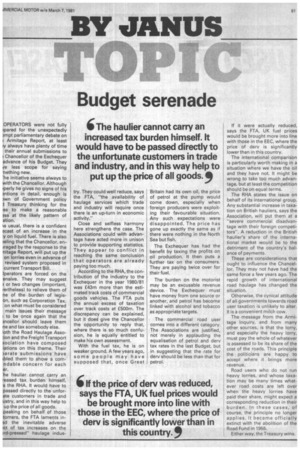Budget serenade
Page 83

If you've noticed an error in this article please click here to report it so we can fix it.
OPERATORS were not fully )pared for the unexpectedly )mpt parliamentary debate on Armitage Report, at least always have plenty of time their annual submissions to Chancellor of the Exchequer advance of his Budget. They ve less scope for saying riething new.
he initiative seems always to with the Chancellor. Although iperly he gives no signs of his antions in detail, enough is )wn of Government policy Treasury thinking for the ss to make a reasonable DSS at the likely pattern of ation.
ks usual, there is a confident ecast of an increase in the :y on liquid fuel. There is also )eling that the Chancellor, enJraged by the response to the nitage Report, will put up the on lorries even in advance of revised system proposed in current Transport Bill.
lperators are forced on the ensive. They may suggest ) or two changes (important, fertheless) to relieve them of ne of the burden of legison, such as Corporation Tax. : on what must be considered main issues their message ; to be once again that the ancellor should leave them ne and tax somebody else. loth the Road Haulage Asso:ion and the Freight Transport sociation have composed iations on this theme. Their )arate submissions have ibled them to show a cornndabie concern for each er.
he haulier cannot carry an -eased tax burden himself, s the RHA. It would have to passed directly to the unforate customers in trade and ustry, and in this way help to up the price of all goods.
peaking on behalf of those tomers, the FTA laments in3d the inevitable adverse :et of tax increases on the ird-pressed" haulage indus try. They could well reduce, says the FTA, "the availability of haulage services which trade and industry will require once there is an up-turn in economic activity."
Close and selfless harmony here strengthens the case. The Associations could with advantage have acted more in unison to provide supporting statistics. They appear to conflict in reaching the same conclusion that operators are already paying too much.
According to the RHA, the contribution of the industry to the Exchequer in the year 1980/81 was £43m more than the estimated track costs of commercial goods vehicles. The FTA puts the annual excess of taxation over track costs at £500m. The discrepancy can be explained, but it doe give the Chancellor the opportunity to reply that, where there is so much confusion, he is equally entitled to make his own assessment.
With the fuel tax, he is on weaker ground. A few years ago, some people may have supposed that, once Great Britain had its own oil, the price of petrol at the pump would come down, especially when foreign producers were exploiting their favourable situation. Any such expectations were disappointed. The price has gone up exactly the same as if there were nothing in the North Sea but fish.
The Exchequer has had the benefit by taxing the profits on oil production. It then puts a further tax on the consumers. They are paying twice over for their fuel.
The burden on the motorist may be an excusable revenue device. The Exchequer must have money from one source or another, and petrol has become linked with alcohol and tobacco as appropriate targets.
The commercial road user comes into a different category. The Associations are justified, not merely in applauding the equalisation of petrol and dery tax rates in the last Budget, hut in suggesting that the rate for dery should be less than that for petrol. If it were actually reduced, says the FTA, UK fuel prices would be brought more into line with those in the EEC, where the price of dery is significantly lower than in this country.
The international comparison is particularly worth making in a situation where we have the oil and they have not. It might be wrong to take too much advantage, but at least the competition should be on equal terms.
The RHA states the issue on behalf of its international group. Any substantial increase in taxation on British hauliers, says the Association, will put them at a "severe commercial disadvantage with their foreign competitors". A reduction in the British haulier's share of the international market would be to the detriment of the country's balance of payments.
These are considerations that ought to influence the Chancellor. They may not have had the same force a few years ago. The rapid growth of international road haulage has changed the situation.
Otherwise, the cynical attitude of all governments towards road user taxation is unlikely to alter. It is a convenient milch cow.
The message from the Armitage Inquiry, and from many other sources, is that the lorry, and especially the heavy lorry, must pay the whole of whatever is assessed to be its share of the cost of the roads. This principle the politicians are happy to accept where it brings more revenue.
Road users who do not run heavy lorries, and whose taxation may be many times whatever road costs are left over when the heavy lorries have paid their share, might expect a corresponding reduction in their burden. In these cases, of course, the principle no longer applies. It became officially extinct with the abolition of the Road Fund in 1955.
Either way, the Treasury wins.
























































































































